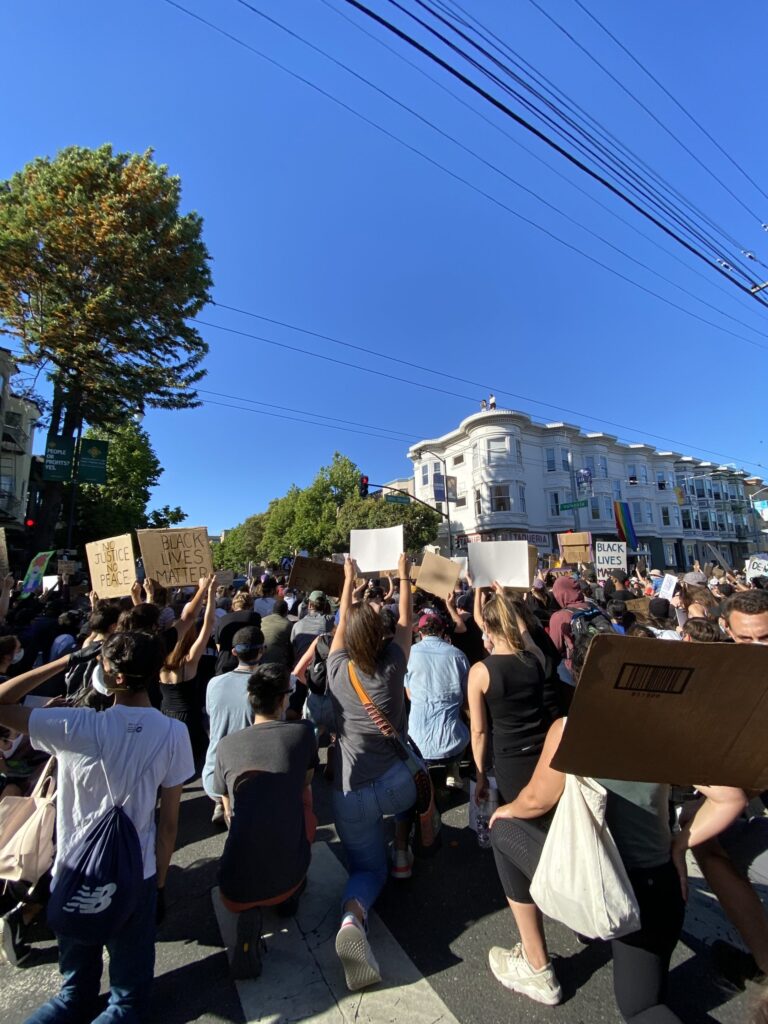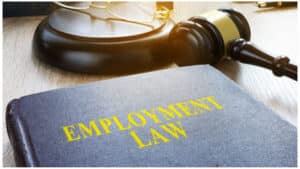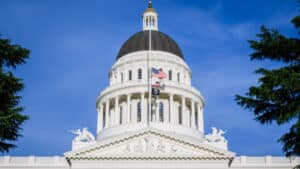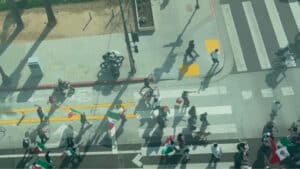Written by Matt Gramly and Christopher B. Dolan:
Does the First Amendment’s “right of the people to peaceably assemble” still apply during a pandemic or to protest marches during a pandemic?
The First Amendment to the Bill of Rights as attached to the Constitution of the United States of America reads as follows:
“Congress shall make no law respecting an establishment of religion, or prohibiting the free exercise thereof; or abridging the freedom of speech, or of the press; or the right of the people peaceably to assemble, and to petition the government for a redress of grievances.”
However, as with any right also comes responsibility. Rights may be regulated by the state. The First Amendment also guarantees freedom of speech, but it is illegal to yell “Fire!” in a crowded movie theater if there is no fire. The Second Amendment guarantees the right to bear arms, but private ownership of military style assault rifles or machine guns in California is heavily regulated if not outright banned. Such is the case with the right to assemble. The right is guaranteed under the Constitution, but it can be regulated by the state, especially if the public health is at issue.
The First Amendment right to assemble is as important today as it was when it was written in 1791. The state’s right to regulate this right is particularly important today as we confront a global pandemic and nationwide protests in response to the murder of George Floyd by police in Minneapolis, Minnesota. This issue was addressed directly by the U.S. Supreme Court in the 1905 case of Jacobson v. Massachusetts. The question before the court was whether or not the state could force people to get the measles vaccine during a measles epidemic even if they did not want the vaccine.
Justice John Marshall Harlan wrote the following in the decision to allow states to require measles vaccinations: “The Constitution does not import an absolute right in each person to be, at all times and in all circumstances, wholly freed from restraint. A community has the right to protect itself against an epidemic and may, at times, under the pressure of great dangers, be subjected to such restraint, to be enforced by reasonable regulations, as the safety of the general public may demand.” The Court ruled that the state may regulate or curtail an individual’s freedom, even though it is guaranteed within the Constitution, in the context of preventing the spread of disease during an epidemic.
The same principle has been applied to the coronavirus pandemic with states issuing shelter in place orders. One type of gathering of particular significance is church gatherings. The First Amendment guarantees the right to free expression of religion, along with the right to peaceably assemble, such as in a church. Shutting down religious services is a very important issue for millions of Americans who argue that nothing is more individual or important than religious faith. Many argue that church services are essential and must remain open to worshippers. How can a Safeway or a Home Depot or a marijuana dispensary be deemed essential, but not a church? It’s a valid question but the courts have mostly sided with the states’ right to regulate.
Churches involve gatherings of large numbers of people in confined spaces indoors and frequently involve singing. Since the coronavirus can spread easily through respiratory system activities such as talking or coughing, singing is an ideal way to spread it, especially indoors. Churches that continued to meet in violation of state orders have become virus transmission “hot spots” as a result.
On May 25, George Floyd, an African American man, died in police custody. Following soon after the killing of Breonna Taylor by Louisville, Kentucky police as she lay sleeping in her bed, and the murder of Ahmaud Arbery by three white men in Georgia, we have seen many protests against police brutality and the killings of African Americans by police. Large protests, like church gatherings, seem like the perfect environment for spreading the coronavirus, except for the fact that they take place outside instead of indoors.
Protest marches with people assembling peacefully petitioning the government for redress of grievances are a clear example of our First Amendment rights; but, we are still in the midst of a dangerous global pandemic. Thousands of people marching in very crowded settings are a big concern for medical professionals and many believe the marches will become hot spots of disease transmission.
Why can the government shut down churches and businesses, but not protest marches? One major distinction is that protests occur outdoors unlike churches and church services, which are generally indoors. Ultimately, local governments struggling to protect their citizens’ First Amendment rights to protest or worship must balance those rights with the important need to protect public health.
Massachusetts Gov. Charlie Baker said on June 1: “As we combat the pandemic, we remain in a real struggle with how to carry out the bedrock principles of democracy with the best medical guidance available to fight an infectious, contagious disease.”
The bottom line is that the First Amendment’s right to assemble can be regulated or curtailed by the state, especially during a pandemic. As of the writing of this article, the U.S. has more than 2 million confirmed coronavirus cases and 112,000 deaths from the disease.










